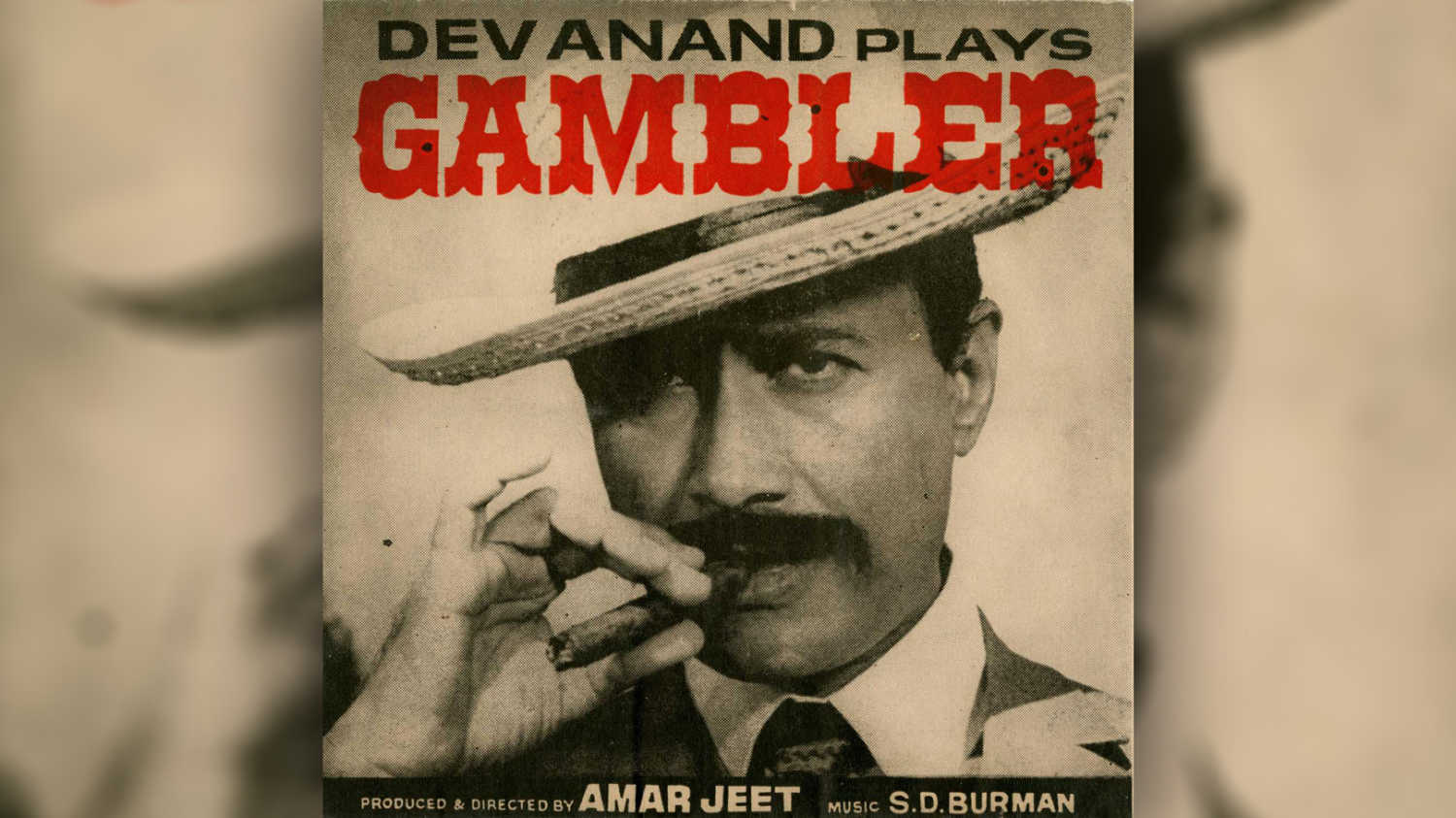Dev Anand draws you into every scene even when his co-artiste is hopelessly hamming his or her way through the dialogues.
50 years of Gambler: An unremarkable film that shines with Dev Anand’s colossal talent and charm
New Delhi - 19 Feb 2021 13:00 IST
Updated : 21:29 IST


Sukhpreet Kahlon
Legendary actor Dev Anand was among the triumvirate of performers from the 1950s and 1960s who left an indelible mark in cinema history, ruling screens and hearts with Raj Kapoor and Dilip Kumar. Of the three, however, Dev Anand was the most daring in the roles he played on screen.
Not interested in only playing the straight-up good guy, the star often portrayed characters with a heart of gold who happen to live outside the law, such as petty criminals, smugglers or gamblers, in films like Baazi (1951), Jaal (1952), C.I.D. (1956), Kala Bazar (1960), Bombai Ka Babu (1960), Jewel Thief (1967) and Johny Mera Naam (1970).
In 1971, Dev Anand had three releases — Tere Mere Sapne, Hare Rama Hare Krishna and Gambler. The last one did not enjoy the success of the first two and remains a lesser film in the pantheon of Dev Anand. It was the second film to be made under the Nalanda banner, the first being Teen Devian (1965).
In Gambler, Anand plays Raja, who is taken in as a boy by Master (Jeevan), a card sharp who tutors him to become a skilled gambler. Raja is beholden to him as Master took him in when his mother had left him at an orphanage as he was born out of wedlock.
While an adept gambler, Raja is good at heart. He meets Chandra (Zaheeda), a social worker, and falls in love with her. He seeks to mend his ways, but Master will not let him out of his grasp so easily. Meanwhile, Chandra finds out the truth about Raja's profession and feels cheated.
After many twists and turns, Raja finds that Master has replaced him with another gambler, Banke Bihari (Shatrughan Sinha). Raja finds that at every turn in his life, he is confronted by the burden of his past and Master. Seeking to get out of his clutches once and for all, he goes to bid farewell to him, but things turn ugly and in the scuffle that ensues, Master is killed. The scene shifts to a court where Raja’s background is revealed.
The film has several engaging elements that, unfortunately, fail to come together compellingly. Despite a stellar supporting cast comprising Jeevan, Manorama, Kishore Sahu, Sapru and Iftekhar, music by SD Burman, and cinematography by Faredoon Irani, the film remains middling and unimpressive. The conflict with Master seems repetitive and the courtship between Raja and Chandra is protracted and becomes tiresome. Zaheeda is quite stiff and her performance is forgettable at best.

The film marked the Hindi debut of actress Zahira, who had earlier appeared in the James Bond film On Her Majesty’s Secret Service (1969). Playing the role of Julie, she supports Raja when all is lost for him and he has nowhere to go. Zahira, too, is underwhelming in the role and does not have much to offer.
What does stand out, however, is the assured performance of a young Sinha who was just starting out in his career. Anand was a mentor to new talent, enabling a host of young people to work in his films. In an interview, Sinha mentioned that Anand was the first person from the industry whom he had met who did not make strugglers feel small. The legendary actor gave Sinha a role in Prem Pujari (1970).
In Gambler, Sinha got a bigger role, where he got the space to showcase his acting chops. Recounting a scene from the film, Sinha said in an interview, “I remember director Amarjeet pulling me up for shouting at Dev saheb in a scene where I had to put a knife to his neck. “How dare you speak that way to Dev Anand?' he yelled. Dev saheb stopped Amarjeet. 'Shatru is in character. Let him do the scene,' he said. I was much appreciated for that scene later.”
However, it is Anand himself who carries the film with his charm and colossal talent. He draws you into every scene even when his co-artiste is hopelessly hamming his or her way through the dialogues. There is a moment when Raja has hit the depths of desperation and steals money from a temple. He is shamefaced as Chandra sees him and puts the money back, cursing his decision and his fate. He prays to god for forgiveness and, at that point, finds that a coin has got stuck in the folds of his trousers. Taking that as a sign that god has forgiven him, he gambles with that coin, but for a good cause this time. It’s an important scene that reminds us that no matter what Raja has done in the past, he is repentant and deserves our sympathy. Only Dev Anand could have pulled off the shifting emotions in that scene with such conviction.
Some of the best scenes are between Anand and Jeevan, each outdoing the other with his swagger and poise. The court scene towards the end of the film particularly stands out as Raja defends himself, not knowing the shocking truth that is about to emerge.
While Gambler was just a middling film, it bears testimony to the talent and spirit of Dev Anand who gave his all to a film and, unlike so many stars of his generation and the next, encouraged and empowered young, emerging talent.





